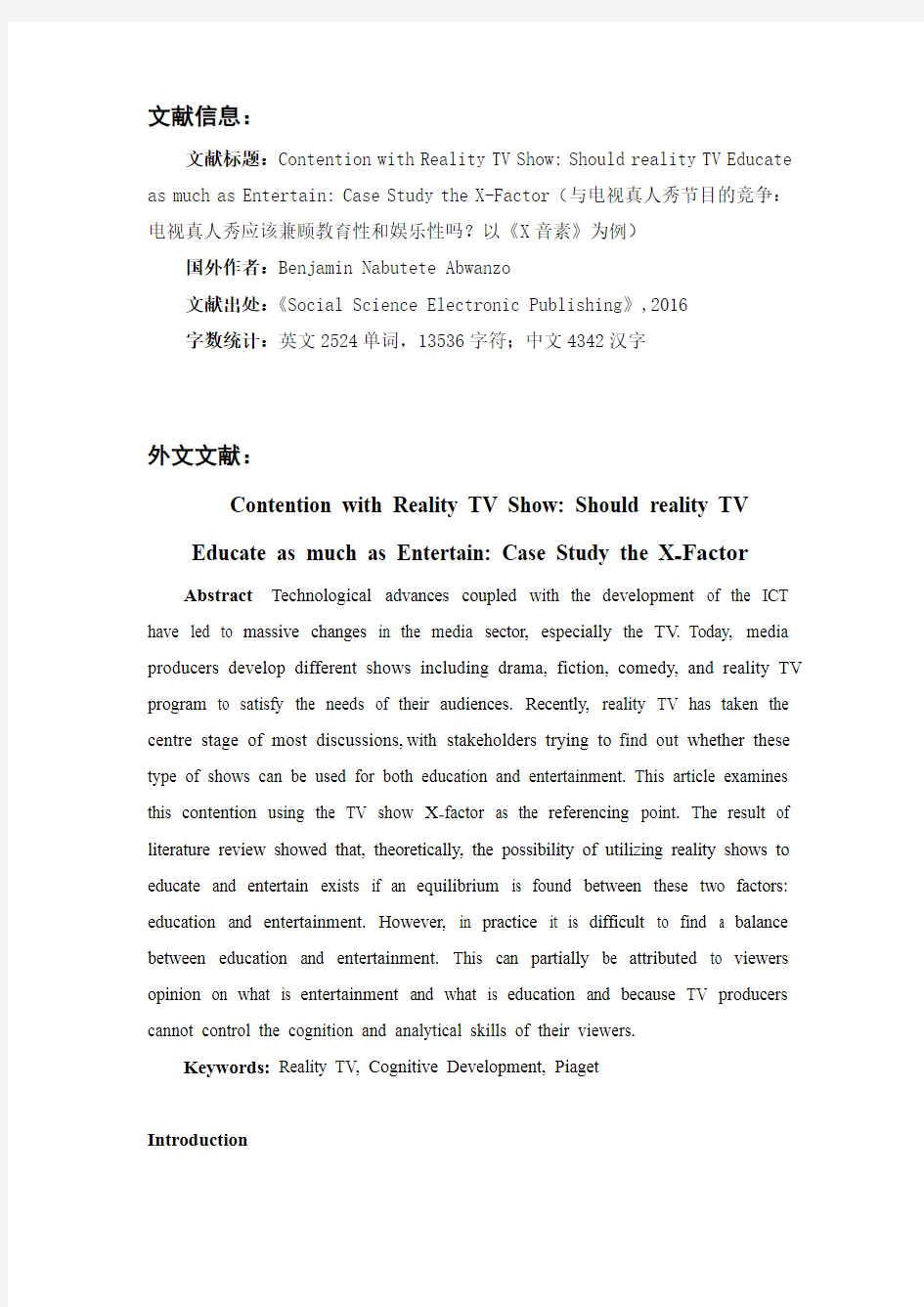电视真人秀节目外文翻译文献

- 1、下载文档前请自行甄别文档内容的完整性,平台不提供额外的编辑、内容补充、找答案等附加服务。
- 2、"仅部分预览"的文档,不可在线预览部分如存在完整性等问题,可反馈申请退款(可完整预览的文档不适用该条件!)。
- 3、如文档侵犯您的权益,请联系客服反馈,我们会尽快为您处理(人工客服工作时间:9:00-18:30)。
文献信息:
文献标题:Contention with Reality TV Show: Should reality TV Educate as much as Entertain: Case Study the X-Factor(与电视真人秀节目的竞争:电视真人秀应该兼顾教育性和娱乐性吗?以《X音素》为例)
国外作者:Benjamin Nabutete Abwanzo
文献出处:《Social Science Electronic Publishing》,2016
字数统计:英文2524单词,13536字符;中文4342汉字
外文文献:
Contention with Reality TV Show: Should reality TV Educate as much as Entertain: Case Study the X-Factor
Abstract Technological advances coupled with the development of the ICT have led to massive changes in the media sector, especially the TV. Today, media producers develop different shows including drama, fiction, comedy, and reality TV program to satisfy the needs of their audiences. Recently, reality TV has taken the centre stage of most discussions, with stakeholders trying to find out whether these type of shows can be used for both education and entertainment. This article examines this contention using the TV show X-factor as the referencing point. The result of literature review showed that, theoretically, the possibility of utilizing reality shows to educate and entertain exists if an equilibrium is found between these two factors: education and entertainment. However, in practice it is difficult to find a balance between education and entertainment. This can partially be attributed to viewers opinion on what is entertainment and what is education and because TV producers cannot control the cognition and analytical skills of their viewers.
Keywords: Reality TV, Cognitive Development, Piaget
Introduction
Today’s society has been characterised by rapid advances and development of information and communication technology. These advances and development have in turn induced significant changes in the media sector, especially the television, which is deemed as one of the most popular entertainment platforms in the world. People regularly tune onto their television sets to watch or find new content for entertainment. For this reason, the media society has been forced to develop different entertainment programmes, such as fiction, action, drama, comedy, and reality television. These programmes not only seek to entertain and satisfy TV audience, but also ensure TV viewers are educated. One type of programme that has gained popularity in the past few decades is reality TV. According to Lees (2010), the increased popularity of reality TV can be attributed to the fact that it shows real life (factual) events and provides immense entertainment to its viewers.
The common assumption among most people is that today’s audiences lack the capacity to differentiate between fact and fiction, or entertainment and information (Hill, 2005). As such, it becomes very difficult to determine whether reality TV can be used for both entertainment and educational purposes. Murray & Ouellette (2004) stated that some audiences prefer the drama, information, and entertainment provided by reality television, whereas, others hate it. This division among the audiences makes it difficult to determine the ratio of entertainment value to an educative value that could satisfy all the audiences. With such concerns surrounding reality TV, it is essential to explore its features and determine whether entertainment and educational value can be attached to this genre of television. This article examines the contention that reality television should be used for both entertainment and educational purposes using the reality TV show The X-factor as the primary reference point.
An Overview of X-Factor
The X-factor is one of the most popular reality TV shows in the UK that concentrates on finding the best musical talent in the UK region and developing it. The show is a part of a franchise that operates in different countries of the world including the United States, Australia, Germany, and Ukraine. It was created by
